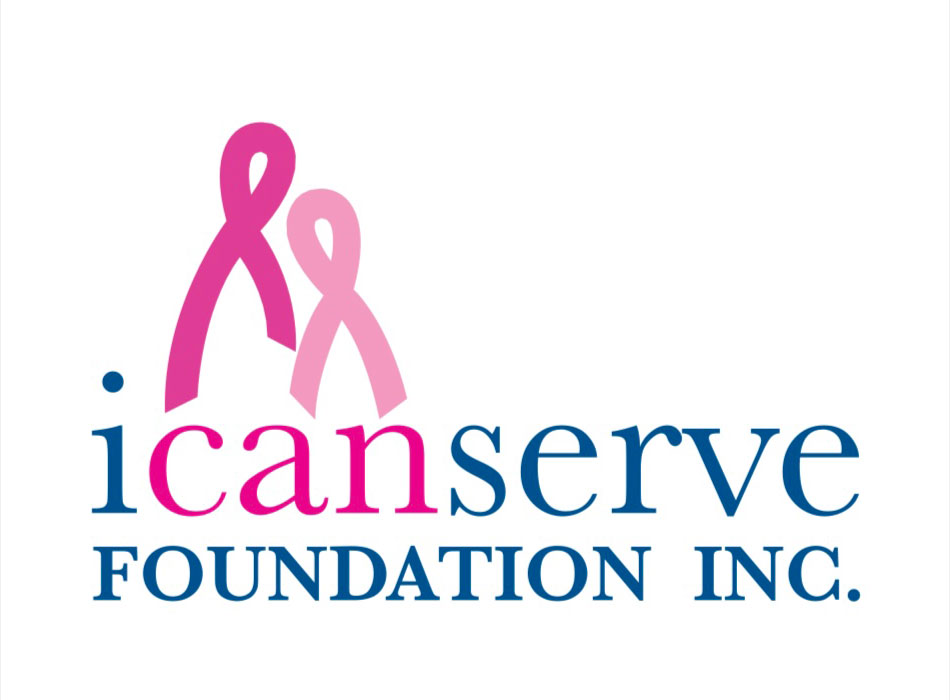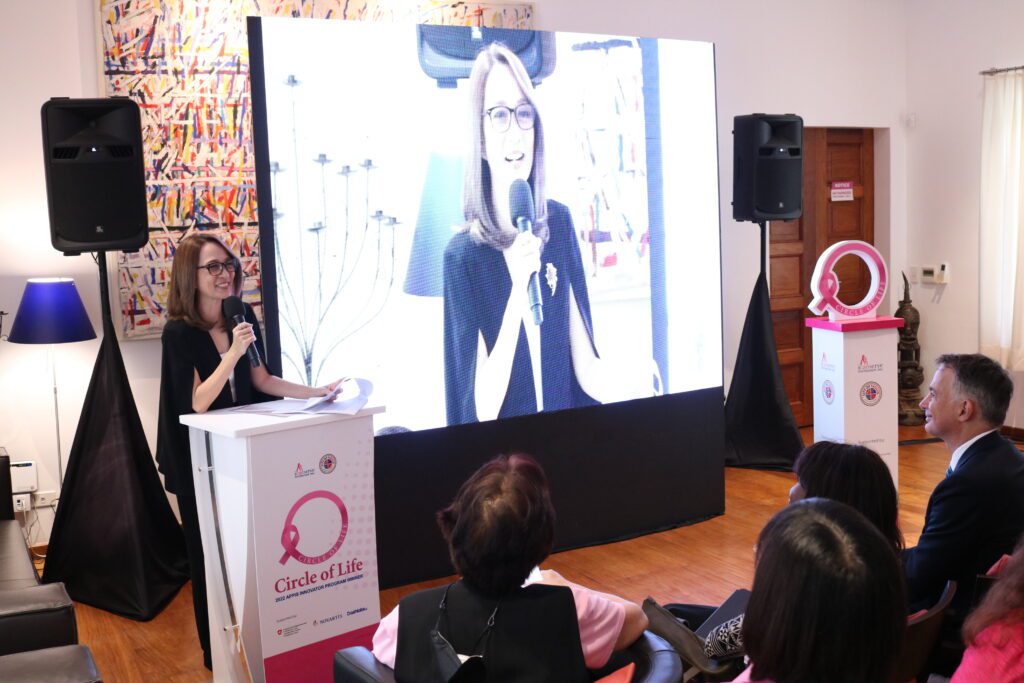Remarks of Kara Magsanoc-Alikpala, founding president of ICANSERVE Foundation:
His Excellency Alain Gaschen, Mayor Lani Cayetano, Usec. Beverly Ho, former Health Secretary Paulyn Ubial, Councilors Tikboy Marcelino and Marisse Eron, friends, colleagues, sisters, good morning. Thank you for being here to help rally our new journey into a new program we call Circle of Life. This will enhance our existing Ating Dibdibin Program or in English, the Take Your Breast Care to Heart program. This is the flagship project of the ICanServe Foundation.
For many the mortality rate of breast cancer in the Philippines is merely cold statistics, but for us, breast cancer survivors and volunteers at ICanServe, this is personal for us. We can put actual names of women and a few men to those statistics. Each of us in the foundation easily know 600 because we have more than 600 members in our private chat groups and pool of survivor volunteers. This, on top of other survivors and patients we know who don’t join the foundation. I think I have met easily over a thousand breast cancer patients in my lifetime.
Those numbers are alarming. And heart crushing.
The death rate represents friends we lost to breast cancer. Many of those deaths could’ve been prevented. If only women recognized breast cancer symptoms and got diagnosed early. If only they gathered the courage to pursue diagnosis and treatment, and beat the myth in their head, that all that is useless, because cancer was another word for death. If only women could afford the expensive cost of cancer care.
We wanted to kill those “ifs.” We wanted to save more lives. We wanted to put a stop to the rising number of maternal orphans. We wanted to spare families from broken hearts, going broke and bankrupt. That’s why we created the Ating Dibdibin Program.
Ating Dibdibin started out as a community-based early breast cancer detection program. Through the years, it expanded to become a full-blown breast cancer control program. The program promotes early detection, early diagnosis, access to timely and affordable treatments, patient navigation and to some extent, palliative care, and supportive care.
The ICanServe partners and co-creates Ating Dibdibin with a city. We only partner if the city agrees to institutionalize the program through an ordinance or local law so the program becomes permanent. The law will assure regular funding. We have six city partners so far.
We started Ating Dibdibin in 2008 under the auspice of the American Cancer Society. In the beginning, very few believed the program made sense or that it would work. It was very tough to convince each of our city partners and other stakeholders. They had to see the impact before the buy-in happened. In the early years, it didn’t help that our local government partners didn’t have much to go with, in terms of data and financing.
Three to four years into the program, help came our way. Financial and medical assistance programs were introduced and improved by the Department of Health, the Philippine Health Insurance Corporation, the Philippine Charity Sweepstakes Office and the Department of Social Welfare and Development. These lightened the financial burden for local governments. National government assistance complemented local financing especially for those with advance and metastatic breast cancer which national government agencies don’t cover at the moment. Except for PCSO and DSWD.
It only got better. In 2019, cancer became part of the national conversation when the National Integrated Cancer Control Act (NICCA) was signed into law. It is one of only two cancer laws in Asia, one of 8 in the world. And according to Mench Auste of the NICCA Council and Cancer Coalition, our law is comprehensive more than most.
By the way, ICanServe is a proud founding member of the Cancer Coalition Philippines that spearheaded the lobbying efforts for the law.
When the law is fully implemented, eventually, every corner of the country should have a breast cancer control program and for that matter, a cancer control program for all cancers. Without being presumptuous, we offer Ating Dibdibin as a best practice for the localization of the Cancer Act.
A few days after the NICCA became law, the Universal Health Care Act or UHC followed suit. These two landmark laws complement each other. Primary health care, a bedrock for achieving UHC, puts emphasis on cancer prevention, early cancer detection, and financial protection, among other things.
In 2021, the World Health Organization through its Global Breast Cancer Initiative released guidelines and targets to reach the goal of reducing breast cancer by 2.5 percent per year, which over a 20 year period, would save 2.5 million lives globally. The Initiative also commissioned pilot projects in India to demonstrate how communities can achieve this.
And one of those project resembles our Ating Dibdibin. We were thrilled to know that Ating Dibdibin designed in 2008 aligned with the strategies and goals and of the 2021 WHO guidelines for countries.
You can say, we simply got lucky that our program, aligned with local and global directives. But I think this happened because we have our pulse on the most important stakeholder in the cancer space—the patient. Something that’s easily overlooked. To this day. Others need research to tell them what our heart knows for sure. Not only do patients have the pulse, we are that major stakeholder. We are the people we try to help so our empathy, I daresay, is near perfect.
But we recognize there are other important stakeholders who have co-created the program. The community or barangay health worker who is the first person and sometimes the only person, the community members trust. The nurses, midwives, doctors in the barangays, city health office, clinics and hospitals that provide quality and critical care. The local legislative body we call Sangguniang Panlungsod who pass and approve health-related agreements. There is the local health board who create policy. The local breast cancer support group who have become a vital partner in providing supportive care especially mental wellness. They have helped complete the holistic care for patients.
I would like to pay tribute to a very important stakeholder. The patient navigators who turn out to be the most critical component for the success of Ating Dibdibin. Without them, I don’t think patients will endure the cancer journey.
There are other stakeholders but for now let me say, in Taguig City, our partner city, all these stakeholders work in perfect harmony. The director of the Philippine General Hospital’s Cancer Institute Dr Jorge Ignacio said, because of Ating Dibdibin, his institute, the biggest catch-all for all poor patients nationwide, has been seeing less breast cancer patients from Taguig in the last four years. The number of women they see at the Cancer institute is down by about 30 percent.
He attributes this to the amazing work of the people of Taguig City who take care of its breast cancer patients. And for me one of the most important messages is that the community in Taguig trusts their government. Trusts them with their lives. That’s the hardest to establish for any health program.
They have continually evolved the Ating Dibdibin Program so it remains responsive and relevant. They have one to two breast cancer patient navigators per barangay. Nowhere else in the Philippines do you have permanent community based navigators for any kind of cancer. Taguig City will do what it takes to save a life. That is why we chose them as the pilot city for the Circle of Life Project.
The project aims to build the data and digital infrastructure for Ating Dibdibin.
Data is the new gold. It has taken on a greater importance and value in the digital age. We’ve always known this but it is expensive, it’s elaborate, it’s tedious. Novartis gave us a chance to jumpstart our dream and gave us a grant. Once the Circle of Life kicks in Taguig, hopefully we can share the learnings with other cities.
I believe with good data and analytics, we can eventually overcome every barrier to quality and timely care for breast cancer. We can identify problems, including those challenges that have yet to surface. Data can guide us to design targeted interventions and solutions. It can tell us if any of our responses are effective and impactful. Nowadays, it’s a necessary investment in saving lives.
All of you here are stakeholders in the breast cancer space. You were invited because you have rallied us all these years, and because we want to thank you for your support in person.
With me from ICanServe are co-founder Crisann Celdran, who is also the Chairman of the Board; Nikoy de Guzman, President; Libet Virata, member of the board of trustees and past chairman of the board; Giselle Arroyo, senior volunteer; Bibeth Orteza, spokesperson and today’s moderator; Dr. Cecile Montales, member of the board of trustees; and Nikki Aloquin, project manager for Circle of Life. On their behalf we thank you for giving our seemingly impossible dream a chance.
Ambassador Gaschen, thank you for your trust. We will work hard so you will never regret having hosted us in your lovely home. Thank you to Team Novartis: Chris, Ruth, Joy, Bing, and Biboy, for believing in us. Thank you, Dr. Beverly, for giving importance to patient groups. Thank you, Dr. Ubial, for being the first biggest champion of the Cancer Law when you were health secretary. I will never forget how in the first meeting, you never displayed a shred of doubt. You immediately set up a meeting with your legislative team.
Thank you Mayor Lani and your team: Ces, Peachy, Dra Lacsina, Dr. Osano, Dr. Quilatan, Dr. Trinidad, Dr. Del Valle, Larry —- for giving us a chance to road test our idea of a life-saving program that you took to a different level. To your legislative team: Councilor Tikboy and Councilor Eron, salamat at ipinasa ninyo yung ordinansiya ng Ating Dibdibin noong 2012 at yung patient navigation ordinance noong 2018! Thank you to the patient navigators Marilyn, and Ernita. You treat each patient like family and as if everyone were an emergency. Salamat, kayo po ang tunay na bayani sa programang ito.
After 10 years of our partnership Mayor Lani and Team Taguig, your enthusiasm and innovative spirit for the program is as fresh as Day 1. If not fresher!
Thank you to my colleague at the Cancer Coalition, Dr. Claire, we appreciate how you always advocate and argue for the poor. Thank you Bryan, Nicole, Christine of Dashlabs. We are a small client but you don’t make us feel like one. We know you value and share our mission and vocation.
Paolo Borromeo and Dr. Ramy Roxas of Healthway Cancer Care Center, thank you for offering to collaborate with Taguig City. We need all the help to make women live longer and do what they do best. Thank you for being the first hospital to give a seat on your governing board to a cancer survivor. We’re usually given the status of “for consultation” only. You subscribe to the favorite saying of patients: “Nothing about us without us.”
In 2008, Dra. Corazon Ngelangel, who helped trained our first batch of AD barangay health workers, said there were past failed attempts at community-based early detection programs. I asked her then: “Do you think Ating Dibdibin will succeed?”. She said, yes, as long as there is a consistent champion. Dr. Ngelangel, happy to report, ICanServe took the challenge. And we’re still here and we can’t continue to do this without you. Thanks for all your support.
Thank you, everyone, for making time. Good day, everyone. God Bless!

